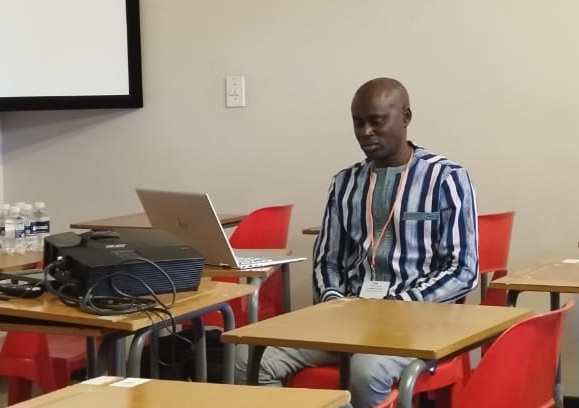The city of Johannesburg is hosting the 19th African Investigative Journalism Conference (#AIJC2023) from 20 to 23 November 2023. Some 140 speakers presented papers in 80 sessions.
The main themes of 2023 were artificial intelligence, health, data journalism, the safety of journalists, the future and sustainability of investigative journalism, investigating organised crime, etc. Elie Kaboré, Publication Director of Minesactu.info, presented a paper on “Investigating the extractive sector in Africa”.
For him, the development of humanity is partly linked to mastering the use of mineral resources. African countries have 30% of the world’s reserves of oil, gas and transition minerals, but are among the poorest in the world. More than half of these countries’ exports come from extractive resources, which account for a large share of their revenue. He invited African journalists to take an interest in the extractive sector because companies exploit non-renewable resources on a human scale, with a naturally limited lifespan. Mining has a major impact on local communities and the environment, and is largely dependent on fluctuating metal prices set independently at world level.
“The extractive sector is the sector of high corruption”, he said. As proof, an OECD report states that 19% of cases of corruption worldwide occur in the extractive sector in the form of bribes paid to public officials. Global Financial Integrity (GFI) goes one step further, revealing that Africa loses 288.267 billion dollars a year through false commercial invoicing between countries. The extractive sector features prominently in false commercial invoicing between states (machinery, mineral fuels).
The mining sector is also a source of conflict. This thesis is confirmed by the United Nations: “Countries that are essentially dependent on their natural resources are more exposed to the risk of violent conflict, due to rising unemployment, inequality and a lack of social services, particularly education”. The most brutal and deadly wars in independent Africa are linked to extractive resources. In the Sahel, the exploitation of natural resources (gold) fuels terrorism. But how can journalists investigate this sector? he asked. In his view, a country like Nigeria lost 16 billion dollars between 1979 and 1983, i.e. 20% of its oil revenues, mainly as a result of fraud, over-invoicing of contracts and theft of crude oil.
“The investigation concerns all stages in the value chain of an extractive project, i.e. the research/exploration, construction, exploitation and closure and rehabilitation phases”, he added. The investigation may cover, among other things, transparency in access to mining contracts (corruption; conflict of interest in the negotiation of contracts), respect for community rights (fair compensation), companies’ compliance with specifications, the role of the state in monitoring and controlling extractive companies, respect for workers’ rights, environmental degradation, the tax system (arbitrary exemptions), fraud, tax evasion, false invoicing, non-payment of revenues), poor collection, management and sharing of revenues, false declaration of production, creation of added value (transformation), access of nationals to jobs and to the purchase of goods and services, corruption of managers and agents, failure to replenish the rehabilitation fund and to rehabilitate sites after exploitation, money laundering, session or transfer of permits, etc.
Where can I find information on the extractive sector? In regional and sub-regional texts: African Mining Vision, Kimberley Process, ECOWAS, CAMAC, etc. At national level: Codes (mining, oil, gas, environment, tax, customs, etc.). The application texts of these various codes at national level, the EITI reports of countries that have signed up to this process, periodic publications by extractive companies, publications on specialised sites such as www.sedar.com, reports by international bodies, African Tax Administration Forum, Tax Justice Network Africa, Global Financial Integrity, OECD Global Forum on Transparency and Exchange of Information for Tax Purposes, NRGI, PWYP, OXFAM, etc., publications by national public bodies, media publications, etc.
Elie Kaboré acknowledged that journalists have difficulty accessing information. The information available is often highly technical and difficult to understand. “Not everyone understands tax, legal or environmental language. Not everyone can read and understand a feasibility study, an environmental and social impact assessment, a mining contract, etc.”. He noted that the mining sector is a closed environment where companies and public administrations communicate very little. As advice, he recommended that journalists turn to specialists in NGOs, civil society and trade unions. He strongly recommended that journalists and the media specialise.
#Mines_Actu_Burkina
#AIJC2023










